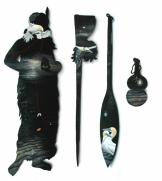Surface Tension
Sometimes, when the world is looking the other way,
I am gorgeous. My eyes and hair shine, I have a glow
I walk with my shoulders back, more graceful than any ballet.
I am a goddess – not that anyone would ever know.
When glances fall on me, I stumble, stutter, spill -
become clumsy and clownish, my radiance fades.
It doesn't matter. Another glorious moment will
sneak up on me, when life's dull tirades
grind me so far down that I need to be lovely again.
I keep my beauty, like treasure, in a velvet box
ready to be applied, a secret balm for secret pain –
a shield against time passing, a curse on clocks.
Remember, when you look, the surface that you see
is only your impression. It never was me.
Skull
English archaeologists
found it at an isolated
forest site, nestled neatly
inside the skeleton’s
hip cavity -
deliberately decapitated,
says the Herald.
His lonely bones, bleached and bare,
allow us a lunch-hour’s conversation,
the newspaper
between us,
half a world,
half a day away.
His end, its brutality
desiccated, stripped and
cleansed by time and distance,
too long , too far for understanding of reasons
or allocation of blame,
distracts us from
the smaller, fresher violences
that injure our days:
this month’s argument
as empty-headed as any ancient skull -
my mobile bill,
his pointless overtime,
or last night’s soup bones,
shredded flesh stripped away,
burning to the pan
in a hiss of recrimination.
Miss Blithe visits the great stereotypes of the world
1 - Paris
Miss Blithe is in Montmartre
sipping burgundy, dipping
a torn-off hunk of crusty baguette
into steaming onion soup.
The air is full of coffee and Chanel,
rolling 'r's, and eloquent
gesticulation.
On the table, by her hand,
a fountain-pen, plump, gold-nibbed
lolls like a sated lover
against a tattered leather notebook.
The thin, dark women
teetering past on stiletto heels
spot the tools,
the ink stains on her fingers,
and their expressions, contemptuous
of her pallor and her pudge shift –
soften, so far as cosmetics allow.
"Une artiste," they murmur,
And click on by.
Miss Blithe welcomes the heavy tick
of a public clock leading towards
the evening Armagnac
at Jean-Christophe's
but she does not long, as drones do,
for its hands to sweep;
she does not yearn after five.
In Miss Blithe's perfect Paree,
Renaults and Citroens
dart past in an absence
of exhaust fumes
their horns
sounding without fury
an auditory Gallic shrug.
The Brie, gooey-soft, still
has that sharp tang of excitement
and the crumbs of her bread
tumble like snowflakes,
all into her soup
except for the three or four
which fall on the pavements
for the pigeons in the plane trees
who coo, but never shit.
2. The Taj Mahal
Miss Blithe's delicately beaded
salwar kameez and
diaphanous dupatta,
purchased predictably from
the Kinara Bazaar,
do not make her look
any less the tourist.
She sees this in the mirror
And yet, feels, somehow,
more ... appropriate,
as she walks, head bowed,
toward the preternatural
whiteness of the dome.
She is almost blinded
By the brilliant excess
of Shah Jahan's public love
for Mumtaz Mahal,
realized in
eternal marble.
Miss Blithe cannot help,
Wondering, however
- even as she gazes
drenched in wonder
at the magnificence -
just what the man
was compensating for.
3. The Grand Canyon
Miss Blithe reflects,
as she watches
the Colorado pass below her,
that even the strongest,
the hardest,
the
most
beautiful
can be scarred
if the pressure on them
is relentless enough.
She does not share this insight
on the postcard
she sends home
to her mother.

